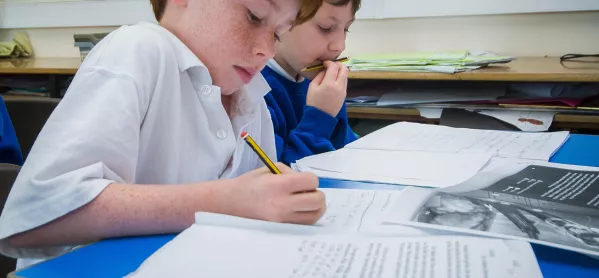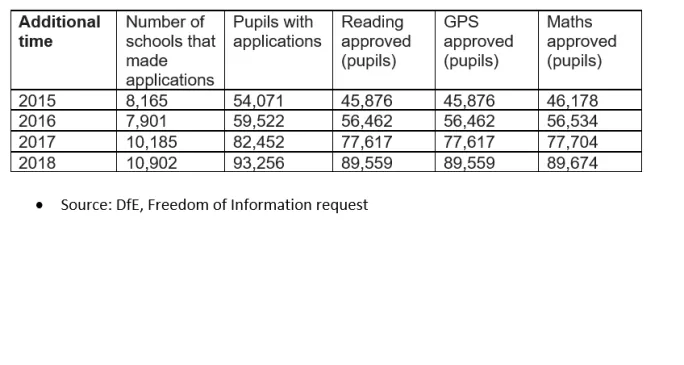
- Home
- Exclusive: Doubling in number of pupils given extra time for Sats
Exclusive: Doubling in number of pupils given extra time for Sats

The number of pupils given extra time to complete Sats tests has almost doubled since 2015, according to new official figures obtained by Tes.
The figures reveal that at least 14 per cent of Year 6 pupils were given additional time to finish the tests this year, and have prompted a warning that schools are “pushing their luck”.
Experts suggest that a combination of accountability pressure to improve scores and the introduction of tougher Sats could be prompting schools to apply to give some pupils with special needs 25 per cent extra time to complete the tests.
A change in the application process could also be a factor.
The Department for Education statistics, obtained through Tes Freedom of Information requests, show that at least 89,674 pupils got more Sats time this year, compared with 46,178 in 2015.
Primary data specialist James Pembroke said: “Increased pressures of accountability may well be resulting in more and more schools pushing their luck when it comes to access arrangements.”
He said he was not surprised by the rise and said he was certain another key reason was “the increased difficulty of tests” since 2016.
Adam Boddison, chief executive of special educational needs charity Nasen, suggested that the increased applications for additional time may “indicate the consequences of such a strong link between Sats results and accountability”.
“In recent years, the notion of outcomes for children has become increasingly focused on academic attainment and we now need to look again and see if we have the balance right between attainment, progress and other outcomes,” he said.
Sats ‘have increased in difficulty’
Dr Boddison also thought tougher Sats were a factor. “Sats tests have increased in difficulty and there appears to be more reading required now, which will mean that learners with SEND may require additional time when that wasn’t previously the case,” he said.
Children with statements of special educational need or education, health and care (EHC) plans automatically get additional time in the tests - and are not included in the numbers provided by the DfE.
Other pupils are entitled to 25 per cent additional time in the Sats tests under certain circumstances, such as having a hearing impairment or having a physical or learning disability which means they write slowly. In these cases schools must apply to the Standards and Testing Agency, which runs the tests, for approval to give pupils additional time.
‘Can the pupil read fluently?’
When applying for pupils to have additional time through an online form, teachers have to answer a number of questions. In 2015 the question on reading difficulty asked: “Can the pupil read the text of practice English reading tests aloud and fluently with no/very few errors?” But since 2016, the additional clause “at a speed of 90 words per minute”, has been added.
Michael Tidd, headteacher of Medmerry Primary in West Sussex, believes this may have influenced teachers’ judgements.
“Until 2015, I think teachers had considered that slow readers who got through the text fluently were not entitled to extra time,” he said. “But from 2016, it means that slow - but otherwise competent - readers are still entitled to the extra time.
“There has also been a change in the difficulty of the tests that means that when teachers are making their judgements about whether pupils can read fluently, they are using much more complex tests than they would have done previously.”
The reading test in 2016 was particularly difficult. A quarter of pupils did not finish the test and exams watchdog Ofqual later ruled that it had been “unduly hard to access”, especially for pupils with special educational needs.
Brian Walton, headteacher of Brookside Academy in Street, Somerset, agreed that the rise could be due to teachers’ concerns about the difficulty of the tests for certain pupils:
“This rise in numbers is possibly due to the ramping up of the difficulty level,” he said. “Maybe more school leaders are ensuring that they give children every chance, as what is clear in the new tests is that time is a key factor for those that struggle.
“They may have the knowledge but it just does not flow at the pace that is needed in the tests. Therefore, getting extra time here gives those children a better chance.”
Monitoring visits
The new tougher Sats were introduced in 2016 and the guidance on access arrangements for children with particular needs states that the arrangements should be based primarily on normal classroom practice and “must never provide an unfair advantage; the support given must not change the test questions and the answers must be the pupil’s own”.
If access arrangements are used inappropriately, the pupil’s results may be annulled. Local authorities have the information on how many applications are made, and can ask for evidence that such access arrangements reflect normal classroom practice during monitoring visits.
‘It is right that pupils who need support, receive it’
The Department for Education says that the data supplied cannot be compared completely accurately, because data from schools that have since closed (including academy converters) has been deleted from its systems. There are around 16,780 primary schools in England, and around 200 primaries have closed and reopened as new schools in each of the past three years.
A spokesperson said: “Where pupils, including those with special educational needs and disabilities, need additional support in key stage 2 assessments, it is right that they receive it.
“We have simplified the process for schools. However, it is kept under regular review. Where allegations are made of access arrangements being used inappropriately, the STA can investigate.”
Number of applications and approvals for additional time in KS2 Sats

Register with Tes and you can read five free articles every month, plus you'll have access to our range of award-winning newsletters.
Keep reading for just £4.90 per month
You've reached your limit of free articles this month. Subscribe for £4.90 per month for three months and get:
- Unlimited access to all Tes magazine content
- Exclusive subscriber-only stories
- Award-winning email newsletters
You've reached your limit of free articles this month. Subscribe for £4.90 per month for three months and get:
- Unlimited access to all Tes magazine content
- Exclusive subscriber-only stories
- Award-winning email newsletters



